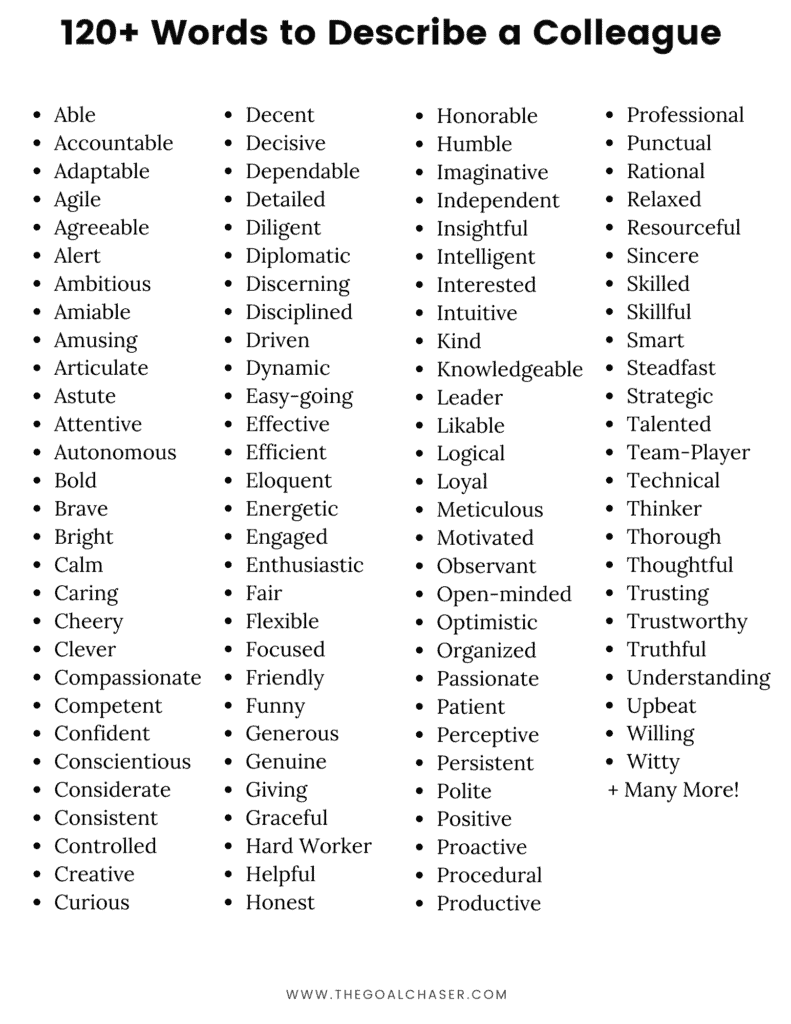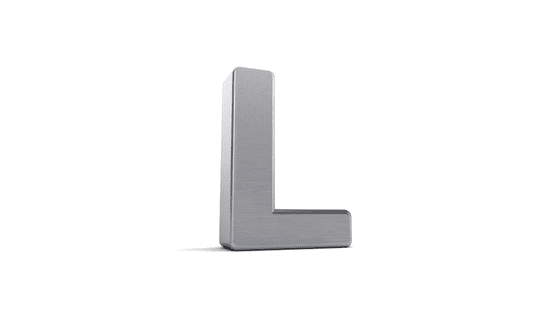Words to Describe a Colleague or Coworker – 120+ Adjectives
Words To Describe Colleagues
There are times that we need to describe our colleagues or coworkers in just a few words. It might be for a peer review, a job recommendation or to simply heap some praise on them for some recent great work.
We might not like or agree with everything that our colleagues do, but we can certainly find positive words to describe their abilities, their skills and their work ethics.
We can also help to create a better work environment and a positive company culture when we are able to give credit where it’s due and express our gratitude, support and appreciation for colleagues.
How Would You Describe a Good Colleague?
A good colleague is one that is competent at their job, a team-player and motivated to be working for the organization and achieving its goals.
They are punctual, hard-working and show initiative by seeking out solutions to problems. They are respectful of other colleagues and help others when required.
They are tactful, courteous and well dressed for work.
A great colleague can stand on their own two feet with minimal supervision (after being sufficiently trained of course!). A great colleague is one that can create and foster a collaborative and supportive working environment, even when faced with difficult challenges and stressful situations.
We do spend a lot of time with co-workers and we get to know them fairly well – not just how skilled they are at their jobs, but also how they handle stress and change.
Words like ‘quick’ or ‘fast’ are praised during appraisal sessions, but they don’t tell us much about what our colleagues do differently than everyone else around us – that’s why the above list of adjectives can help expand on your descriptions.
Positive Adjectives To Describe Colleagues
These positive words can help to articulate specific characteristics, behaviors and abilities of your colleagues, instead of using the normal, ‘great’, ‘satisfactory’ or ‘quick-learner’ that are often overused and don’t allow for a clear picture:
- Able – capable or competent. Possessing the necessary skills or qualities to perform the task or role effectively.
- Accountable – willing to take responsibility for one’s actions and be answerable for the outcomes of those actions.
- Adaptable – capable of adjusting to new or changing circumstances and situations.
- Agile – the ability to move quickly and easily, both physically and mentally, to respond to situations and solve problems.
- Agreeable – pleasant to work with, easy to get along with, and willing to collaborate with others.
- Alert – watchful, attentive, and aware of one’s surroundings and circumstances.
- Ambitious – having a strong desire to achieve goals and succeed in one’s career or other endeavors.
- Amiable – friendly, sociable, and approachable – making it easy for others to work with them.
- Amusing – entertaining, funny, or humorous, making work more enjoyable for others.
- Articulate – able to express oneself clearly and effectively in speech or writing.
- Astute – perceptive, insightful, and able to make shrewd judgments or decisions.
- Attentive – pays close attention to details and shows concern for others’ needs and well-being.
- Autonomous – the ability to be independent, self-directed, and able to work with little or no supervision.
- Bold – willing to take risks and confront challenges with courage and confidence.
- Brave – fearless and courageous in the face of danger, adversity, or uncertainty.
- Bright – intelligent, quick-witted, and mentally sharp.
- Calm – composed, cool-headed, and able to maintain one’s composure even in stressful situations.
- Caring – showing concern and empathy for others, and taking an interest in their well-being.
- Cheery – bright and happy in disposition, and able to spread positive energy to those around them.
- Clever – quick to understand and learn new things, and able to come up with smart and inventive solutions to problems.
- Compassionate – understanding and sympathetic to others’ feelings and needs, and willing to help and support them.
- Competent – skilled, knowledgeable, and capable of performing tasks and duties effectively.
- Confident – self-assured, self-reliant, and capable of taking on challenges with a sense of certainty and poise.
- Conscientious – diligent and thorough in one’s work, and taking great care to ensure that tasks are done accurately and completely.
- Considerate – thoughtful and courteous, and taking care to show respect and consideration for others.
- Consistent – reliable and predictable in one’s work, and able to deliver results consistently over time.
- Controlled – exhibiting discipline, self-control, and a measured approach to one’s work and interactions with others.
- Creative – imaginative and inventive, and able to come up with original and innovative ideas and solutions.
- Curious – eager to learn and explore new things, and taking an active interest in the world around them.
- Decent – respectable, honest, and fair in one’s dealings with others.
- Decisive – able to make firm and quick decisions in a timely manner, often in high-pressure situations.
- Dependable – trustworthy and reliable, and able to consistently deliver quality work and meet deadlines.
- Detailed – thorough and meticulous in one’s work, and able to focus on even the smallest details.
- Diligent – hardworking, persistent, and dedicated to achieving goals and producing high-quality work.
- Diplomatic – skilled in navigating sensitive or difficult situations and relationships, and able to maintain a positive and productive working environment.
- Discerning – perceptive and insightful, able to understand and distinguish important details and nuances in complex situations.
- Disciplined – committed to a structured and organized approach to work, and able to maintain focus and follow through on tasks and responsibilities.
- Driven – ambitious, motivated, and focused on achieving goals and succeeding in one’s career or other endeavors.
- Dynamic – energetic, adaptable, and able to thrive in a fast-paced and constantly changing environment.
- Easy-going – relaxed, flexible, and able to work well with others in a calm and stress-free manner.
- Effective – able to produce results and achieve goals in an efficient and productive manner.
- Efficient – capable of achieving goals and completing tasks quickly and with minimal waste of time or resources.
- Eloquent – articulate and persuasive in speech or writing, and able to communicate ideas effectively.
- Energetic – full of vitality and vigor, and able to work with enthusiasm and passion.
- Engaged – actively involved and invested in one’s work and projects, and willing to go the extra mile to achieve success.
- Enthusiastic – passionate, optimistic, and excited about one’s work and the opportunities for growth and success.
- Fair – impartial and just in one’s treatment of others, and committed to upholding ethical and moral standards.
- Flexible – able to adapt to changing circumstances and situations, and willing to adjust one’s approach to work as needed.
- Focused – concentrated and attentive, able to maintain a clear and unwavering focus on one’s goals and priorities.
- Friendly – outgoing, approachable, and easy to get along with, making it easy for others to work with them.
- Funny – humorous and entertaining, able to lighten the mood and create a positive and enjoyable working environment.
- Generous – willing to give freely and generously of one’s time, resources, or expertise to help others.
- Genuine – authentic and sincere in one’s interactions with others, and true to oneself.
- Giving – selfless and generous in one’s actions and interactions with others, often putting the needs of others before their own.
- Graceful – poised, elegant, and able to move or act in a fluid and graceful manner.
- Hard Worker – diligent, committed, and willing to put in the effort and long hours needed to achieve success.
- Helpful – willing to lend a hand or provide support to others in need, and able to make a positive impact in the lives of those around them.
- Honest – truthful and straightforward in one’s dealings with others, and committed to upholding ethical and moral standards.
- Honorable – having strong moral principles and values, and committed to acting with integrity and honor.
- Humble – modest and unassuming in one’s accomplishments, and willing to acknowledge the contributions of others.
- Imaginative – creative and innovative, able to come up with unique and original ideas and solutions.
- Independent – self-reliant and able to work autonomously, often taking initiative and working well without close supervision.
- Insightful – perceptive and able to understand the underlying motivations, dynamics, and complexities of a situation or problem.
- Intelligent – sharp-minded and knowledgeable, able to quickly understand and learn new concepts and ideas.
- Interested – curious and engaged, showing an active interest and involvement in one’s work or projects.
- Intuitive – able to perceive and understand things intuitively, often based on one’s instincts and feelings.
- Kind – compassionate, considerate, and generous towards others, often showing empathy and understanding.
- Knowledgeable – possessing a deep and comprehensive understanding of a particular subject or field, often acquired through experience or education.
- Leader – a strong and capable leader who is able to motivate and inspire others, and guide them towards achieving common goals.
- Likable – personable and easy to get along with, often well-liked by others.
- Logical – rational and able to think critically, often able to make sound decisions based on data and evidence.
- Loyal – devoted and committed to one’s team or organization, often showing unwavering loyalty and dedication.
- Meticulous – thorough and precise, paying close attention to detail and taking great care to ensure accuracy and quality.
- Motivated – driven and committed to achieving one’s goals, often willing to go above and beyond to accomplish tasks and overcome obstacles.
- Observant – perceptive and aware of one’s surroundings, often able to notice details and pick up on subtle cues.
- Open-minded – willing to consider new ideas and perspectives, often able to listen to and respect the opinions of others.
- Optimistic – positive and hopeful, often seeing the best in people and situations, and believing that things will turn out well.
- Organized – methodical and systematic, able to plan and manage tasks and projects efficiently, often resulting in timely and successful outcomes.
- Passionate – driven and enthusiastic about one’s work, often deeply committed to achieving one’s goals and making a positive impact.
- Patient – able to remain calm and composed in the face of challenges or difficult situations, often showing tolerance and understanding.
- Perceptive – attentive and observant, able to pick up on subtle cues and nuances, often leading to a deeper understanding of a situation or individual.
- Persistent – determined and tenacious, willing to keep pushing towards a goal even in the face of obstacles or setbacks.
- Polite – courteous and respectful in one’s interactions with others, often showing consideration and good manners.
- Positive – optimistic and upbeat, often able to maintain a positive attitude and outlook even in difficult or challenging situations
- Proactive – taking initiative and taking action to solve problems or address issues before they become more serious.
- Procedural – knowledgeable and adherent to established policies, procedures, and protocols, often resulting in effective and efficient operations.
- Productive – able to accomplish a significant amount of work in a given amount of time, often resulting in high levels of productivity and output.
- Professional – conducting oneself with a high level of professionalism, often demonstrating expertise and competence in one’s field or industry.
- Punctual – arriving on time and meeting deadlines, often demonstrating respect for others’ time and a commitment to reliability and dependability.
- Rational – logical and reasonable, often making decisions based on careful analysis and critical thinking.
- Relaxed – calm and at ease, often able to remain composed and focused even in stressful or challenging situations.
- Resourceful – able to find creative solutions to problems, often using available resources in innovative ways to achieve results.
- Sincere – honest and genuine, often demonstrating authenticity and a deep commitment to one’s work and relationships.
- Skilled – possessing a high level of expertise and proficiency in one’s field, often resulting in high-quality work and successful outcomes.
- Smart – intelligent and knowledgeable, often able to think quickly and make well-informed decisions.
- Steadfast – unwavering in one’s beliefs or commitments, often demonstrating loyalty and dedication to one’s work and colleagues.
- Strategic – able to think and plan strategically, often developing and implementing effective long-term plans and solutions.
- Talented – possessing natural abilities or skills, often resulting in exceptional work and achievement.
- Team-Player – cooperative and collaborative, able to work effectively with others towards a common goal.
- Technical – possessing specialized technical knowledge and expertise, often resulting in the ability to solve complex technical problems.
- Thinker – able to think critically and creatively, often developing new and innovative ideas and approaches.
- Thorough – meticulous and detailed, able to complete tasks and projects with a high degree of accuracy and precision.
- Thoughtful – considerate and empathetic, often demonstrating care and concern for others’ feelings and needs.
- Trusting – willing to trust and rely on others, often demonstrating a strong sense of trustworthiness and integrity.
- Trustworthy – dependable and reliable, often demonstrating honesty and integrity in one’s work and relationships.
- Truthful – honest and truthful in one’s interactions, often demonstrating a commitment to transparency and ethical behavior.
- Understanding – empathetic and compassionate, often able to understand and relate to others’ perspectives and experiences.
- Upbeat – positive and optimistic, often able to maintain a positive attitude and outlook even in challenging situations.
- Willing – open and eager to take on new challenges and responsibilities, often demonstrating a willingness to learn and grow.
- Witty – clever and humorous, often able to inject humor and levity into situations while remaining professional.
Words To Describe A Colleague – A Bad Coworker
Occasionally, we have a coworker that isn’t so great unfortunately.
The following list of adjectives are commonly used to describe a colleague who brings down the energy of a workplace, doesn’t do their share of the work, is unsafe in the workplace or is just generally unreliable:
- absent
- aloof
- bleak
- careless
- chatty
- complainer
- dirty
- disengaged
- greedy
- judgemental
- late
- lazy
- loud
- moody
- narcissistic
- needy
- negative
- pouty
- silly
- sly
- smelly
- toxic
- uninterested
- unmotivated
- unprepared
- unreasonable
- unreliable
- unsafe
- wasteful
- winey
We hope you don’t experience them too much over your working career!
For more lists of adjectives and positive words, be sure to check out:
- 150+ Words To Describe A Good Leader
- 200+ Words To Describe Attitude
- 180+ Words To Describe Bad Behavior
- 125+ Funny Words To Describe Someone
- 180+ Words To Describe Students & Adjectives For Students
- 350+ Positive Words to Describe Someone – List of Adjectives
- Words To Describe A Hardworking Person
- Words To Describe A Good Employee (With Definitions)






